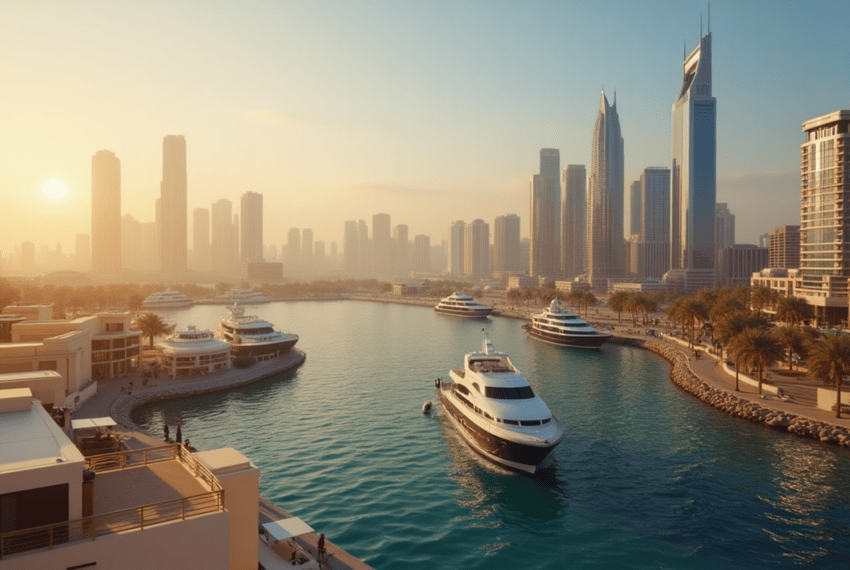The Gulf Cooperation Council (GCC), which includes Bahrain, Kuwait, Oman, Qatar, Saudi Arabia, and the United Arab Emirates (UAE), is significantly transforming its urban development landscape. These countries are making substantial investments in smart cities—urban areas that utilize technology to improve the quality of life for both residents and tourists. This transformation focuses on how these initiatives enhance the travel and tourism experience.

Saudi Arabia’s Vision 2030 initiative aims to diversify its economy and reduce reliance on oil revenues. A key element of this plan is the development of NEOM, a visionary $500 billion project located near the Red Sea. NEOM is designed to consist of multiple cities, airports, seaports, and innovation centers, all interconnected through advanced technology. A standout feature of this project is “The Line,” a 170 km linear city that ensures all essential services are within a five-minute walk and is powered entirely by renewable energy. This ambitious development aims to redefine urban living by merging nature with state-of-the-art technology.
In addition to NEOM, Saudi Arabia’s Quality of Life Program, launched in 2018, focuses on boosting recreational facilities and promoting tourism. This program has led to the opening of cinemas, the introduction of electronic tourist visas, and the organization of entertainment events that attracted over 46 million visitors in 2020. These initiatives have expanded entertainment options and streamlined travel processes, making Saudi Arabia a more appealing destination for tourists.
The UAE has established itself as a frontrunner in smart city development, with Masdar City in Abu Dhabi serving as a notable example. Founded in 2006, Masdar City is a sustainable urban development powered by renewable energy. It acts as a hub for clean technology and innovation, allowing tourists to explore sustainable living practices through interactive exhibits and environmental awareness events.
Dubai has also launched the Smart Dubai initiative, which aims to transform the city into the world’s smartest and happiest. This initiative includes the implementation of over 200 intelligent city services across various sectors, including transportation, healthcare, and urban planning. For tourists, this means access to smart tourism services such as paperless transactions, smart parking, and real-time updates on public transport, which enhance the overall travel experience.
Qatar’s Msheireb Downtown Doha project represents a major advancement towards sustainable urban living. Marketed as the world’s first sustainable downtown regeneration project, it combines traditional Qatari architecture with modern technology. Tourists can enjoy a unique blend of cultural heritage and contemporary amenities, with smart infrastructure ensuring a smooth and engaging experience.
While Bahrain, Kuwait, and Oman may not have large-scale smart cities comparable to their GCC counterparts, they are making significant progress in integrating smart technologies into their urban planning. Bahrain aims to establish itself as a gateway between the UK and the Gulf, focusing on infrastructure development and tourism. This includes initiatives to develop green technologies and advanced manufacturing, improving travel experiences through enhanced facilities and services.
Kuwait and Oman are also exploring smart city concepts, prioritizing improvements in public services and sustainability. These efforts are intended to elevate the quality of life for residents while providing tourists with modern amenities amidst rich cultural landscapes.
The smart city initiatives across the GCC present numerous advantages for travelers and tourists. Enhanced connectivity through advanced transportation systems, including autonomous vehicles and smart traffic management, reduces travel times and improves access to tourist destinations. Additionally, data analytics and AI-driven services offer personalized recommendations for dining, entertainment, and attractions, catering to individual preferences.
Sustainability is a key focus, particularly in cities like Masdar City and NEOM, where eco-friendly initiatives allow tourists to engage with responsible tourism practices. Furthermore, smart surveillance and emergency response systems enhance safety, providing travelers with peace of mind during their visits. The design of these smart cities also aims to blend modernity with tradition, offering tourists a unique mix of technological advancement and rich cultural experiences.
The GCC’s commitment to smart cities marks a transformative phase in urban development, positively impacting tourism. As these projects materialize, travelers can expect enhanced experiences characterized by convenience, sustainability, and cultural richness, positioning the region as a beacon of modern urban living and an attractive destination for tourists worldwide.


Leave a Reply